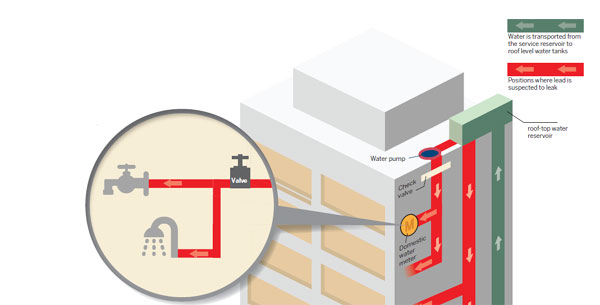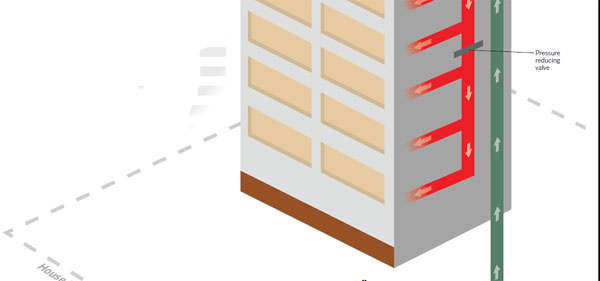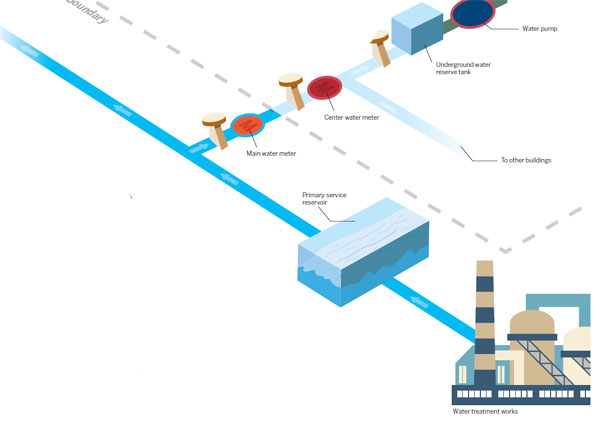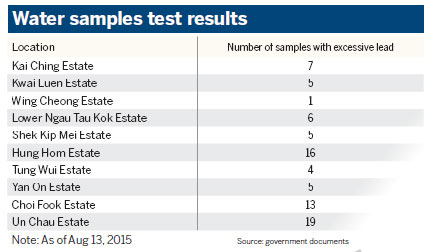Contaminated water source a lead-pipe cinch
Updated: 2015-08-20 08:08
By Sylvia Chang(HK Edition)
|
|||||||||
As the fear of ingesting excessive lead through potable water haunts the public housing residents in Hong Kong, Sylvia Chang
asks experts about the consequences of such contamination.
Residents of the Kwai Luen Estate look like they were living back in the 1960s, crowding around an open square to collect water from a tank. Women and children fill their buckets, stagger to their feet and totter off under the weight. A woman holding her baby in one hand and a bucket in the other struggles to unscrew the tap to fill her bucket. Others crouch beside storm drains, washing fish and vegetables. Pedestrians must walk around them.
Since mid last month, 10 public housing estates have been discovered to contain high levels of lead in tap water, raising an alarm among residents. The highest lead level found in the water samples was 153 micrograms per liter (g/dL), 14.3 times higher than the World Health Organization standard of 10 g/dL. Residents stopped using tap water for drinking and cooking, hauling water from an open, common area outside the building instead.
Wan Siu-kin describes the situation as "a disaster for the community". As the scandal over lead in the water supply grew, Wan founded the Drinking Water Victims Alliance to follow up related affairs.
"Tens of thousands of residents are affected by contaminated water," Wan estimates. It could reach that point. The majority of Hong Kong's 200 public housing estates are still waiting to be tested.
The cause of high lead content in the water supply has yet to be established. Three task forces have been set up. It took nearly a month to establish a Commission of Inquiry on Aug 13 and it will take the commission another nine months to issue its preliminary report.
Lack of government regulation
The lack of regulatory oversight of construction work on water supplies, no requirement for reporting on lead levels during inspections, unprofessional licensed plumbers and the economy-controlled contracting system - all are major factors behind high lead content in water, said Chan Sou-tung at a seminar organized by the Hong Kong Institute of Incorporated Engineers. Chan is a Hong Kong-registered engineer and former chairman of the Hong Kong Institution of Engineers Environmental Division.
Hong Kong's Water Supplies Department (WSD) and the Housing Department require "lead-free solders" for soldering alloys for copper and copper alloy capillary fittings. Neither department conducts tests to verify that the solders are lead free.
"Theoretically, there is no lead-free requirement for reporting the materials contained in soldering and brazing," Ho Kin-man said at the seminar. A certified testing professional working as a laboratory supervisor for almost 30 years, Ho questions how contractors can ever meet the government requirements.
WHO guidelines specify maximum safe levels for each of four heavy metals in tap water, lead, cadmium, chromium and nickel. Only this month did the WSD add the four heavy metals to its list of water quality testing parameters.
Risky by WHO standards
Hundreds of blood tests, most of them taken from children under 8, pregnant women and nursing mothers, show levels of lead above the WHO guideline.
With testing still in its early stages, many more unfavorable results are expected. Lawmakers and engineers concur that fundamental flaws exist in the regulations governing building developments, and that the problem is compounded by a lack of effective supervision of the city's water supply systems.
Toni Lee, a resident of Kwai Luen Estate, stopped using tap water for drinking and cooking a month ago, after the first case of lead contamination was reported. The 35-year-old mother also stopped breast-feeding her 11-month-old baby, fearing that her breast milk might contain lead.
On July 26, a blood test of Lee's baby showed a level of 7.6 g/dL, significantly above the standard of 5 ug/dL and an indicator of potential health risks. Lee is haunted by that possibility. Now she uses distilled water to wash feeding bottles and does not let her baby play in water. "I'm scared my baby might swallow water by accident," Lee explains.
Levels of lead revealed by blood tests carried out to date range from 5 to 15 g/dL. Every 2 g/dL of lead in the blood has been correlated with a three-point decrease in a child's Intelligence Quotient. The finding points to slower development of language skills, memory recall and other intellectual impairments, says Lam Hung-san, professor at the Department of Paediatrics, Faculty of Medicine at the Chinese University of Hong Kong (CUHK).
"There is no standard as to how much lead in blood is safe. We should aim for zero exposure to lead, but practically should develop effective strategies to minimize risk of lead exposure," Lam says.
He explains that the risk of anemia, kidney and neurological problems in otherwise healthy low-risk individuals may not arise until blood levels of lead exceed 44 g/dL. Overall, the blood lead levels detected in Hong Kong so far in the recent lead incident are not high enough to cause acute poisoning, or multi-organ complications.
But measures should be taken to reduce the overall population's risk of exposure to lead, provide public education on how to decrease the effects of chronic lead exposure and conduct more scientific studies to better understand how to effectively deal with chronic lead exposure, Lam adds.
A WHO report notes that lead present in tap water rarely comes from the water supply itself. The principal source is household plumbing systems containing lead pipes.
The government vows that the three task forces and the Commission of Inquiry will discover the source of excess lead in the water supply. The government has promised to provide bottled, distilled water to affected housing estates, provide access to water from tanks installed in common areas, follow up cases of individuals whose blood tests show an excess level of lead and offer health consultations.
And yet the scandal continues to boil on high heat. Trust among residents of the public housing estates needs to be earned back. Lee and other residents are concerned that the building's water supply may contain other contaminants, owing to the poor supervision.
Wan of the Drinking Water Victims Alliance says he is assisting residents to file lawsuits, and is demanding a full investigation of building contractors. He suspects that the contractors involved might have provided false documents to the government, an indictable offense under the city's Crime Ordinance. The maximum penalty for anyone convicted of the offense is 14 years in prison.
Contact the writer at sylvia@chinadailyhk.com





(HK Edition 08/20/2015 page11)